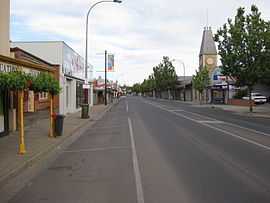Clare, South Australia
| Clare South Australia | |
|---|---|
 Main North Road, looking north | |
 Clare | |
| Coordinates | 33°50′0″S 138°56′0″E / 33.83333°S 138.93333°ECoordinates: 33°50′0″S 138°56′0″E / 33.83333°S 138.93333°E |
| Population | 3,063 (2006)[1] (2006 Census) |
| Established | 1842 |
| Postcode(s) | 5453 |
| Elevation | 392 m (1,286 ft) |
| Mayor | Allan Aughey |
| Location | |
| LGA(s) | District Council of Clare and Gilbert Valleys |
| Region | Mid North |
| State electorate(s) | Frome |
| Federal Division(s) | Wakefield |
The town of Clare (postcode 5453) is located in South Australia in the Mid North region, 136 km north of Adelaide. It gives its name to the Clare Valley wine and tourist region.
History

One of the first settlers in the area was John Horrocks, in 1839. The town itself was established in 1842 by Edward Burton Gleeson, and named after his ancestral home of County Clare in Ireland.[2]
The town was first named Inchiquin, which this was later changed. Lake Inchiquin is now the name of a reservoir located to the north of the town, near the golf club.
A railway line was built from Riverton to Clare in 1919 and on to Spalding in 1922. It closed in 1974 and the tracks were removed in the 1980s after damage caused by the Ash Wednesday fires of 1983. The alignment now carries the Riesling Trail walking and cycling trail.
The layout of the town's road system was apparently designed by a draughtsman in Adelaide, without any knowledge of the local geography. [citation needed] There are several roads in Clare that end abruptly at a cliff face, only to continue again at the top of the cliff.
Geography/climate
| Climate data for Clare | |||||||||||||
|---|---|---|---|---|---|---|---|---|---|---|---|---|---|
| Month | Jan | Feb | Mar | Apr | May | Jun | Jul | Aug | Sep | Oct | Nov | Dec | Year |
| Average high °C (°F) | 30.3 (86.5) |
29.9 (85.8) |
25.9 (78.6) |
21.6 (70.9) |
17.1 (62.8) |
13.5 (56.3) |
12.8 (55) |
14.2 (57.6) |
17.3 (63.1) |
20.4 (68.7) |
24.9 (76.8) |
27.3 (81.1) |
21.3 (70.3) |
| Average low °C (°F) | 14.7 (58.5) |
15.0 (59) |
12.0 (53.6) |
8.9 (48) |
6.3 (43.3) |
4.9 (40.8) |
4.0 (39.2) |
4.4 (39.9) |
6.1 (43) |
7.8 (46) |
10.9 (51.6) |
12.4 (54.3) |
9.0 (48.2) |
| Rainfall mm (inches) | 18.3 (0.72) |
23.5 (0.925) |
27.3 (1.075) |
32.8 (1.291) |
51.3 (2.02) |
65.7 (2.587) |
66.1 (2.602) |
64.7 (2.547) |
59.1 (2.327) |
50.2 (1.976) |
38.5 (1.516) |
37.4 (1.472) |
534.9 (21.058) |
| Avg. precipitation days | 2.6 | 2.5 | 3.0 | 4.4 | 6.8 | 9.8 | 11.1 | 10.4 | 7.7 | 5.9 | 5.1 | 4.0 | 73.3 |
| Source: Bureau of Meteorology[3] | |||||||||||||
The town today
Clare has become recognised for its 'experiences', including the famed Riesling Trail walking and cycling route between Clare and Auburn (25 km), on the former railway line, so named as it weaves past vinyards and wineries. The Clare Valley wine region continues within the same line of hills as the famous Barossa Valley, and also produces some excellent wine.
As one of the larger towns in the region, Clare is also an administrative and service centre.
Governance
Clare is governed at the local level by the District Council of Clare and Gilbert Valleys. Clare lies in the state electoral district of Frome and the federal electoral division of Division of Wakefield.
See also
References
- ↑ Australian Bureau of Statistics (25 October 2007). "Clare (State Suburb)". 2006 Census QuickStats. Retrieved 2008-05-17.
- ↑ Rodney Cockburn (1908, revised 1984). What's in a name? Nomenclature of South Australia. Fergusson Publications.
- ↑ "CLARE HIGH SCHOOL". Climate statistics for Australian locations. Bureau of Meteorology. Retrieved 25 July 2013.
External links
| |||||
| ||||||||